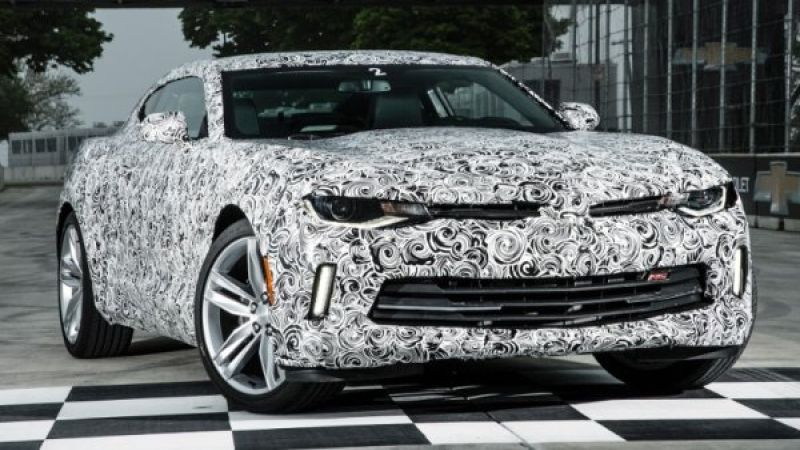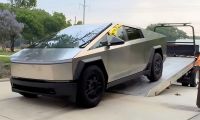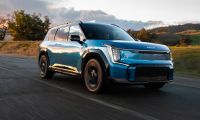Yesterday, we looked at the possible weight ratings for the 2016 Chevrolet Camaro RS with the new turbocharged 4-cylinder engine and how a big weight reduction from 2015 to 2016 could help the new turbo Camaro compete with the new EcoBoost Mustang. However, when we focus more on the sales battle than an actual head to head race, pricing could play a bigger role than overall performance and – based on the early information – it appears as though the turbo-4 will be the entry level engine for the 2016 Camaro RS, where the EcoBoost engine for the 2015 Mustang is a $1,500 upgrade.
Base Pricing – Mustang VS Camaro
If you build a 2015 Mustang and a 2015 Camaro on the Ford.com and Chevrolet.com websites, you will find that both base model V6 cars carry an MSRP of $24,700 including the destination fee. Those prices are for the new 2015 Mustang V6 fastback with a manual transmission and the “old” 2015 Camaro 1LS with the V6 engine and the manual transmission. Opting up to the 2015 Ford Mustang EcoBoost fastback with the manual transmission lifts the price to $26,200, making the turbocharged 2.3L mill with 310 horsepower and 320lb-ft of torque a $1,500 option.
While we don’t know any pricing numbers for the 2016 Chevrolet Camaro, we can expect the overall price range to be in the same basic range as the 2015 Ford Mustang, so there shouldn’t be a big price hike for the next generation Camaro. The thing is, with the turbocharged 2.0L 4-cylinder mill serving as the base model engine below the 3.6L V6, it will likely cost less than the V6 – leaving us to wonder how the pricing will be laid out for the 2016 Camaro.
Possible 2016 Camaro Pricing
While we don’t have any pricing for the 2016 Chevrolet Camaro, it seems as though the turbo 4 will cost less than the 2016 V6 Camaro in one of two scenarios.
First, the 2016 V6 Camaro could be priced similarly to the V6 Mustang with the turbo 4 being below that price, which would make the turbocharged 4-cylinder Camaro the least expensive option in the muscle car segment. Basically, the pricing schedule for the 2016 Camaro V6 and SS would be relatively similar to the current prices, but the new turbo-4 would enter below any other models…and below any of the 2015 Ford Mustang packages.
Second, the 2016 Camaro entry pricing would remain in the same range, but rather than the V6 engine, base level Camaro buyers will get the 2.0L turbocharged engine. This would make the 3.6L V6 an upgrade engine option, which would allow the company to effectively shift the pricing range upwards, with the new V6 costing slightly more than the 2015 Camaro V6, while the turbo-4 would satisfy the needs of those new Camaro buyers who want to spend the least at the dealership and at the pump.
If Nothing Else, Except Little Increase
Regardless of how the pricing schedule of the 2016 Chevrolet Camaro is laid out, I believe strongly that we will see very minimal price increases with the new models. While a new generation performance car generally comes with a slight bump in pricing, a slight bump across the board will make the 2016 Camaro more expensive than the new Mustang across the board, with the only real advantage coming when you compare the prices of the two turbocharged 4-cylinder models. Being more expensive in almost every way could hurt Camaro sales, so I would expect only a minimal increase for the new models, as GM looks to maintain the competitive pricing with the new Mustang.
Set as google preferred source












Comments
Camaro has been more
Permalink
Camaro has been more expensive than Mustang for much of its existence, so why anyone would expect it will be less with the release of the best Camaro ever(by very, very far)... beyond me.
The 6th gen is more expensive to create and more expensive to build, according to many "online accolades" about how great it is. We know for sure, the engine costs more in the SS, thanks to DI. It's also some 37-47 lb heavier, which leads some to wonder if the "200 lb less" weight will be seen on real scales. Updates to the V6 didn't likely affect pricing noticeably. The turbo 4 is a base engine in other cars too, so it's likely not a big drain in terms of cost and that makes it rather smart to use it as base, even though the V6 is also base or otherwise used in other cars(many, many others). As mentioned, placing the 4 at base can allow for a price bump in the others, but that should be fully expected anyway, considering just the hype GM has been laying on the 6th gen.
Anyway, the car costs the most ever to produce. I expect increases of about $2,000 for the base V6 and V8 models. That could allow the 4cyl turbo car to sell at the current pricing. Barring a price increase though, GM is almost certain to lose money on Camaro and that's not acceptable.
Since it's fully expected(in V8 at least) to out-perform Mustang GT, I don't see any concern in a 2k increase. I don't think it will sell like the Mustang, regardless.
Since when in the past 10
Permalink
Since when in the past 10 years has any Camaro beaten a Mustang GT does anyone think that dinosaur pushrod V-8 will best the Mustang HA!!!! when donkey's fly!!!
Steve, though I'd rather not
Permalink
In reply to Since when in the past 10 by Steve (not verified)
Steve, though I'd rather not rant, some things need to be said. The Camaro is available in many forms and the Z/28, until the GT350, beat any resale Mustang sold by Ford in several aspects, including road course race prowess. It was just plain faster on the race track. On the 1/4 mile, the Mustang has been top dog for many years and that may continue, but for 2015, there is no road legal Mustang that is certain to be quicker than the ZL1... except maybe the same GT350, which we can't actually get yet. Even then, it's gonna be close. In a nutshell, it's not just cut and dry as to which is the better performer.
As to the "dinosaur" pushrod V8, that's a total fallacy any which way we look at it. 1st off, the pushrod V8 design is roughly 45 years... YOUNGER... than the OHC design, which was invented by 1902. Dual OHC has been around since at least 1912 ... that's more than 100 years for either and as far as I can tell, the OHV "dinosaur" was 1st put to use in 1949... The patent was filed for by Arthur Chevrolet in 1928 and he got it in 1930. So we could say they've been around that long. Either way, they're "newer" than OHC and DOHC,
Not only that, the current "LT" series isn't your fathers Oldsmobile, by any means. The engines are aluminum vs iron from way back, They're more efficient than ever, utilizing that "old school" cylinder deactivation... oh wait, that's not old. They also all have Direct Injection these days. They also have variable valve timing... these are hardly "Jurassic" and shouldn't be referred to as "dinosaur" based on the facts.
The 2016 Camaro SS will be quicker than the 2015(and apparently 16) Mustang GT. The V6 model is also likely to be quicker than V6 Mustang, but the 4cyl will likely fall notably short.
It's probable that the only Mustang "winning" in V8 form will be the GT350 and while I personally have no problem with that(actual sanctioned racing favors Mustang) because the correct base is more important than the stock win, it's only going to get more competitive for 2017 and 18, at the rate things are going. The end result is, customer win. The real problem with Camaro is the same as it's been since 2009 ... outward visibility. They perform fine and they're rather efficient. Of course, rear passengers won't care about any of that, the other drawback, but Mustang isn't much better there.
You mean to tell me that any
Permalink
In reply to Steve, though I'd rather not by Rob (not verified)
You mean to tell me that any Camaro or Challenger for that matter has bested the 2012, 2013 or 2014 Shelby GT-500????? None even came close!!!
Steve, man, it's cool to rep
Permalink
In reply to You mean to tell me that any by Steve (not verified)
Steve, man, it's cool to rep FORD. I love Mustangs, but do all the other FORD fans a favor, do it with knowledge. FORD specifically designed the GT350 R for this year to go after the Z/28, because the Z/28 made the GT500 look like a Hotwheels toy, in both straight-line power and road course handling. GM caught FORD completely off guard with the Z. Keep in mind, HORSEPOWER means nothing when the gearing is not right and that is one thing GM has always done better than FORD, and that is using the correct gear ratios to maximize it's use of power. FORD has always been on the conservative side of gear ratios, often making them too tall to out hustle the GM's.
Get ready to saddle up. I
Permalink
In reply to Since when in the past 10 by Steve (not verified)
Get ready to saddle up. I just sold my Rousch for a ZL1 and I chose it over the new ZO6 Corvette. Well, the $20K savings helped also. The new Camaro is an awesome ride. Haven't had the opportunity to drive a new redesigned hot rod Mustang or the Z-28 yet but the ZL1 will be hard to beat.
COPIED FROM ANOTHER POST:
Permalink
COPIED FROM ANOTHER POST:
Ford NEUTERED the V6 HP in order to elevate their ecoboost, they even devalued the V6 HP a bit in order for it not to compete with the ecoboost. As a matter of fact, I was expecting Ford to add Direct Injection to the V6, which the Camaro V6 has, but they did not. Additionally they removed the availability of the Track Pack from the V6. But still, the V6 Mustang can hold its own. The automatic Camaro turbo is listed by GM at 3339 lbs, a 0-60 of 5.4 and a 1/4 mi of 14.0 at 99, .85g’s. Just FYI a heavier 2015 Caddy ATS coupe tested by CD, which the Camaro shares the chassis/engine/trannys, at 3,479 lbs with the turbo 4 pulled 0-60 5.7, ¼ mi at 14.1@101. CD also tested a 2015 Ford Mustang V6 auto, and, at 3,588 lbs it had the following perf stats: 0-60 5.5, ¼ mil 14.0@102, .86g’s which is very close to the ecoboost numbers as well. So the turbo 4 Camaro auto is lighter than the V6 Mustang auto by 200 lbs. The V6 Mustang auto weighs 6 lbs more than the Turbo Mustang, as per Ford. The real killer of all this is the V6 Camaro auto, which will rip all of the above, manual or auto. You should be able to get good discounts on the 2015/2016 Mustang V6. The Camaro will sell closer to list since it is a new model. The advantage of the Turbo 4 Camaro over the V6 Mustang is that it's easier to upgrade performance, just by reprogramming the chip for a higher boost/hp.
IN ADDITION: Also see this article, which only compares HP and not torque figures, in which the 4 cyl Camaro would whoop-ass the V6 Stang on the base model. On the midrange model, the Camaro does have a HP advantage but the Mustang has more torque, but loses that proposition by being heavier, and we already know the V6 AUTO Camaro pulls a 12.5 1/4 mile. On the V8s the Camaro will whip the Stang....and even the base Camaro SS will keep up with a lucious sounding base GT350 in the track, on the street, at the autocross and at the strip, but at more than $10,000 difference.